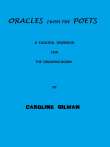You are here
قراءة كتاب Oracles from the Poets A Fanciful Diversion for the Drawing Room
تنويه: تعرض هنا نبذة من اول ١٠ صفحات فقط من الكتاب الالكتروني، لقراءة الكتاب كاملا اضغط على الزر “اشتر الآن"

Oracles from the Poets A Fanciful Diversion for the Drawing Room
those hackneyed into adages, could be gained from Milton, on account of the abstract, lofty, and continuous flow of his diction. Coleridge has corresponding peculiarities.
Keats and Shelley are the poets of the heavens. Byron, with faint exceptions, does not describe a flower, or musical sound, or place of residence.
The American poets, in contradistinction to their elder and superior brethren of the fatherland, display a more marked devotion to nature, with which a continual glow of religious sentiment aptly harmonizes.
But I am recalled by these lengthening paragraphs to my disclaimer, and only wish that an abler and more philosophical pen than mine could take my recent experience.
After a close examination of the earlier dramatic poets, though I have rescued from them some exquisite gems, it seems to me far from desirable that they should be brought forward as prominently as many of their wordy commentators desire. A kind of pure instinct in the British taste has placed Shakspeare without a brother on the throne. The fathers of dramatic poetry acted according to their light, but it was not the "true light." A few relics, selected with caution, may honor their memory, but we should be careful while warning our youth against the impurities of some modern poets, how we extol these vulgarities of a darker moral age.
Before parting I must ask clemency for classing all my authors among Poets, that great word so deservedly sacred, and to which I bow with deep reverence; but the Parnassus of my Oracles has many steps, and I cannot but feel kindly towards those, who sit gracefully even on the lower platform, nor apprehend that they will do more than look up deferentially to the laurel-crowned worthies at its summit. Besides, it has been the character of my taste, or perhaps philosophy, whenever literally or figuratively I gather a wreath of flowers, to twine the wild blossom as heartily as the exotic, and even insert a weed, if its color or contrast lends beauty to the combination;—and thus with my Oracles.
CATALOGUE OF AUTHORS
QUOTED IN THE ORACLES.
ENGLISH.
- Akenside
- Addison
- Bloomfield
- Bowring
- Bayley
- Barbauld
- Burns
- Beattie
- Byron
- Bowles
- Baillie
- Barton
- Browne
- Butler
- Beaumont and Fletcher
- Croly
- Cowper
- Carew
- Cowley
- Collins
- Congreve
- Campbell
- Chatterton
- Cibber
- Cunningham
- Cook
- Coleridge
- Crabbe
- Cornwall
- Cumberland
- Chaucer
- Coleman
- Clark
- Churchill
- Carrington
- Crashaw
- Dryden
- Darwin
- Elliott
- Ferguson
- Falconer
- Gray
- Goldsmith
- Gay
- Gisborne
- Grahame
- Howitt
- Hemans
- Home
- Habington
- Hunt
- Hogg
- Hayley
- Hammond
- Hastings
- Herbert
- Hood
- King James
- Johnson
- Jones
- Jonson
- Keats
- Kemble
- Landon
- Lee
- Lamb
- Lyttleton
- Miller
- Motherwell
- Massinger
- Moore
- Milton
- Mitford
- More
- Mason
- Murphy
- Massinger
- Milman
- Montgomery
- Mackenzie
- Macaulay
- Macneil
- Maturin
- Norton
- Ossian
- Pollok
- Pope
- Prior
- Pomfret
- Percy's Reliques
- Ramsay
- Rowe
- Rogers
- Roscoe
- Shelley
- Shakspeare
- Southey
- Sheridan
- Spenser
- Sotheby
- Sterling
- Shenstone
- Swift
- Scott
- Smith
- Somerville
- Taylor, John
- Tennent
- Thomson
- Tighe
- Talfourd
- Tennyson
- Tobin
- Taylor


